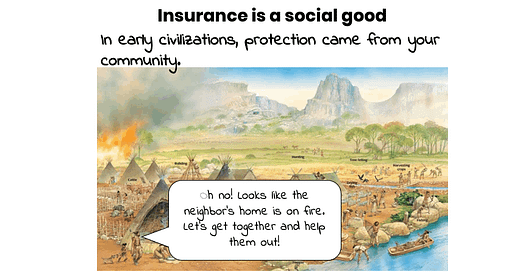As I was writing the post about Beneplan, the employee benefits co-op, I dove deep into the world of insurance.
It would have been crazy long to include it in the main post so I’ve broken it out here.
I love a good origin story (see here for the one I did on where flexible workplace policies originated) because it helps us understand why things are the way they are today. And this one is no different.
Turns out that the Beneplan model is actually one of the oldest insurance models in the books. So while you might think of Beneplan as a disruptor, they are really more of an archaic business.
Insurance dates back to the earliest civilizations. Although there wasn’t a financial exchange, if someone’s house burned down in the community, the neighbours helped rebuild it. Each family was covered in case of accident or loss by the commitment of their fellow community members.
One of the first written insurance policies was in the Code of Hammurabi in 1750 BC. King Hammurabi inscribed 262 laws, standards, fines or punishment for his dynasty, which was located in and around present-day Iraq. One of the laws related to merchant insurance. It stated that they could take loans to pay for the shipping of their goods. If they arrived successfully, they would have to pay back the loan with interest. But if the ship sank, they wouldn’t have to pay anything.
The same type of rule was set for farmers. Code number 42 states:
“If any one owe a debt for a loan, and a storm prostrates the grain, or the harvest fail, or the grain does not grow for lack of water; in that year he need not give his creditor any grain, he washes his debt-tablet in water and pays no rent for this year.”
Side note, I find the Code of Hammurabi one of the most fascinating insights to the ancient world. The full code covers all aspects of society from what to do in case of adultery, how much to pay a craftsman and is the origin of an “eye for an eye”.
Back to insurance… Over time, formal insurance plans evolved to cover more than just merchants. Fire insurance plays an important role in the history of firefighting as insurance companies would pay fire brigades to put out fires for houses they insured. Things got a little messy when fires spread to adjoining uninsured houses hence the government stepped in with public funding. Religious groups and other affiliations also offered insurance via friendly societies, in which members would contribute funds and then support those in the group who fell on hard times.
The point being of this mini history review is that insurance is a social good that has been around for as long as human civilization. Insurance supports us in times of need: house burning down, income earning family member dying, tooth aching, shipping sinking.
From here, go read about how Beneplan is changing the game in health benefits. Their simple model is not anything new. It is a riff on the insurance model used before Jesus was born.
Or, if you already read it, here’s two more things to procrastinate before going back to work…
💾
Jess





